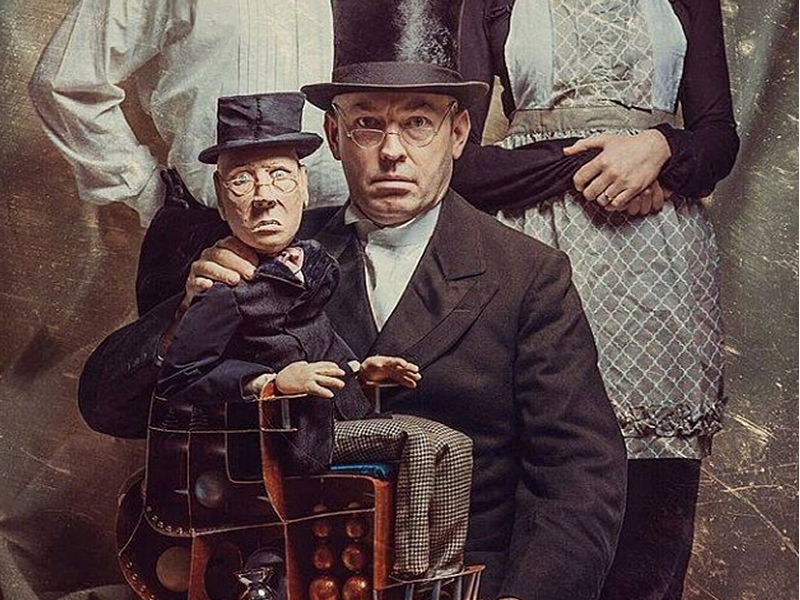HG Wells’ The Time Machine, published in 1895, is sometimes credited with being the first sci-fi novel (although some might say that Mary Shelley beat him to it by 80 years with Frankenstein). Regardless, his novella, featuring the adventures of a man named only as The Time Traveller, is a seminal text, and this production reminds us that Wells’ ideas travel through time most magnificently, and seem as pertinent today as they were then.
This production of The Time Machine – elegantly combining puppetry and live performance, revelling in Victoriana, and chock full of hearty energy – is headed up by Rick Conte, who will be known to Total Theatre readers for his work on two Award winning puppetry shows, The Man Who Planted Trees, and Shona Reppe’s Cinderella. Top-notch design/scenography brings together beautifully made papier-mâché puppets (by Matt Rudkin, who appears live as The Time Traveller, side-by-side with his puppet self!); a gorgeous set design by Rebecca Hamilton, the main set-piece being a velvet-curtained doorway cum bookshelf cum fireplace that provides a great frame for both puppet and human action; and hand-painted image projections by the very talented Daisy Jordan.
The three-person team onstage –Matt Rudkin, Rick Conte, and Deborah Arnott – are brimming with robust energy, and it is all delivered as a rather cheery romp, playing up the gung-ho aspects of the story, and picking up on any opportunity for physical comedy. They all move with ease from character roles to Bunraku-style puppet operation and more, multi-tasking from the beginning to the end of the show.
The story in brief: The Time Traveller has invented a machine that can move in the fourth dimension, time. He tells his dinner guests at his house in a well-to-do part of London that he is going to test his machine, and sets off from his Victorian dining room to arrive in the same place in AD 802,701, now a beautiful pastoral land, inhabited by a peaceful, vegetarian and gentle (to the point of apathy) humanoid species called the Eloi. But all is not as idyllic as it first seems – below the ground live the Morlocks, whose life is spent in darkness, and who live off of Eloi flesh…
This is a show aimed at young audiences, so the horror of the Morlocks is softened by their portrayal as rather comic big-headed, red-eyed creatures. And there are other changes: the gentle waif-like Weena, an Eloi girl that The Time Traveller rescues from drowning and befriends, is far more feisty and funny than Wells’ original.
Adapting a novel, even a short one like The Time Machine, into a dramatic script inevitably means that some things are left out or compressed. Here, the ending of the story feels very rushed – although I do very much appreciate the giant butterfly that appears in what is now 30 million years in the future, picking up on a butterfly motif introduced earlier. There are a few moments when the script plays above the heads of the intended young audience to amuse the parents, and these nudge-nudge wink-wink moments I find uncomfortable. But I do very much enjoy the references to London in the 1890s that add some context to the story, and suggest possible reasons for the future split in mankind: the legacy of industrial Britain with its dark mines and sweatshops; the construction of the London Underground, with its heavy cost to construction workers’ health.
There is also a solid political message brought forth from Wells’ story and relayed to this young audience: it is inevitable that inequalities and the progress of elitism will result in more and more divides in society – and perhaps if we carry on the way we are going, we will end up split into Eloi and Morlock tribes! Many of these ideas are further explored in the very lovely The Time Machine Times that is given out at the show, the work of poet and wordsmith Elspeth Murray.
A word of praise too for the venue: attending shows at the Scottish Storytelling Centre, a year-round venue dedicated to supporting Scottish writers, artists and theatre-makers, is always a pleasure.

